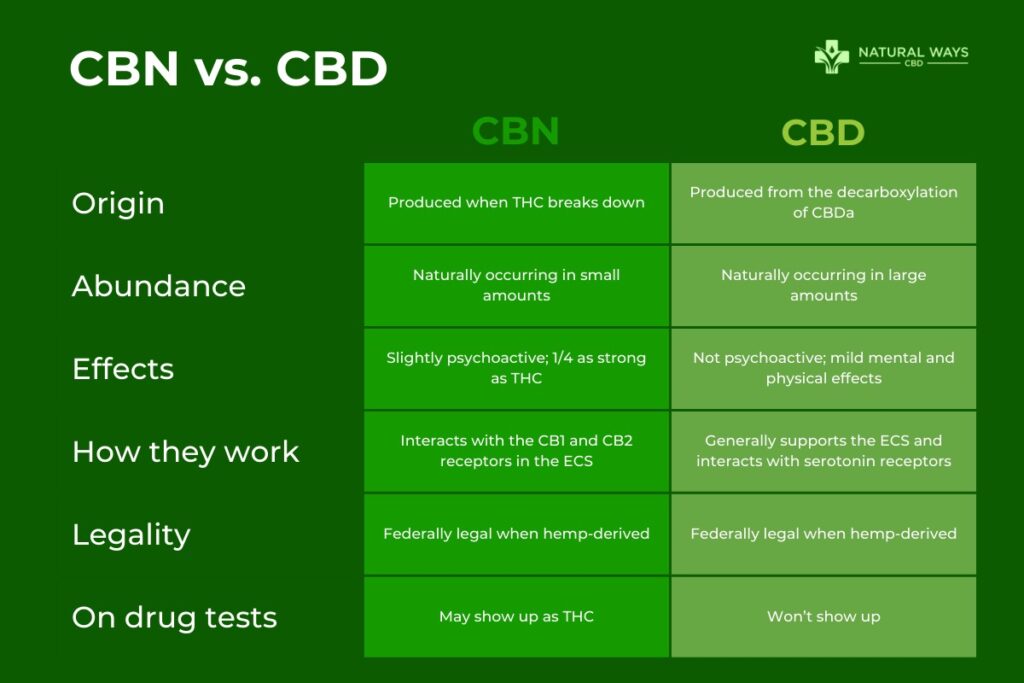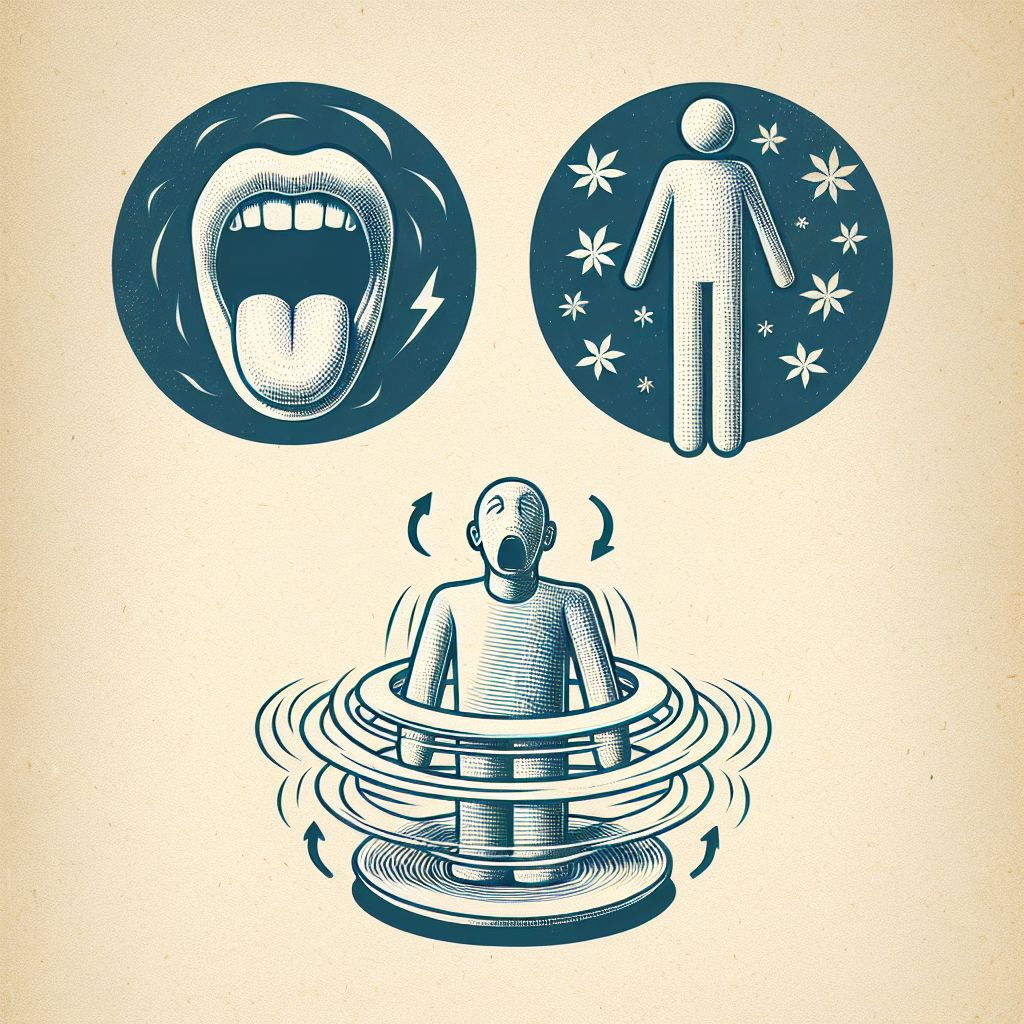Key Takeaways
- CBD and CBN are both cannabinoids found in the cannabis plant, but they have different effects and uses.
- CBD is more widely researched and available, offering benefits like reduced anxiety and pain relief.
- CBN is known for its potential sleep-inducing properties, making it a popular choice for those with insomnia.
- Both CBD and CBN are non-psychoactive, meaning they won’t get you “high” like THC does.
- It’s crucial to consult with a healthcare professional before starting any cannabinoid regimen to determine the right dosage and product for your needs.

“CBN vs. CBD: Differences …” from www.naturalwayscbd.com
Differences Between CBD and CBN
Understanding the differences between CBD (cannabidiol) and CBN (cannabinol) is key to choosing the right natural remedy for your needs. Both are cannabinoids, which are compounds found in the cannabis plant. However, they have distinct characteristics and benefits that set them apart.
Origin and Chemical Composition
Let’s start with where these compounds come from. CBD is primarily extracted from hemp, a variety of the cannabis plant. It is abundant in the plant, making it easier to source and more available in the market. CBN, on the other hand, is a product of aged THC (tetrahydrocannabinol). As THC breaks down, it converts into CBN. Therefore, CBN is typically found in older cannabis plants.
Because of this origin difference, CBD and CBN have unique chemical compositions. CBD is known for its stable structure, which contributes to its non-intoxicating nature. CBN, while also non-intoxicating, can have mild psychoactive effects, although these are much weaker compared to THC.
Interaction with the Endocannabinoid System
The endocannabinoid system (ECS) is a complex cell-signaling system in our bodies that plays a role in regulating a range of functions and processes, including sleep, mood, appetite, and memory. Both CBD and CBN interact with the ECS but in different ways.
CBD is known to influence the ECS by indirectly affecting the receptors. It doesn’t bind directly to the receptors but instead modifies the receptor’s ability to bind to cannabinoids. This action helps regulate pain, inflammation, and anxiety. CBN, however, has a more direct interaction with the ECS. It binds to the CB1 and CB2 receptors, although its affinity is much lower than THC, leading to its subtle effects. For more information on the differences between these compounds, you can explore CBD vs CBN.
Intoxicating Properties
One of the most common concerns about cannabinoids is whether they will cause a “high.” It’s important to note that both CBD and CBN are non-psychoactive, which means they won’t produce the euphoric effects associated with THC.
CBD is well-known for its calming effects without altering one’s state of mind. It’s often used for its therapeutic benefits without any intoxicating side effects. CBN, while derived from THC, has only mild psychoactive properties, which are usually negligible. This makes it a safe option for those looking to avoid the high but still want the potential benefits of cannabinoids.
CBD and CBN both offer therapeutic benefits without the high, making them ideal for daily use.” – Natural Remedies Expert
Legal Status and Availability
The legal status of CBD and CBN can vary depending on where you live. Generally, CBD is more widely accepted and legally available due to its non-psychoactive nature and its derivation from hemp. In many countries, CBD products are legal as long as they contain less than 0.3% THC.
CBN, however, is less prevalent in the market. Its availability can be limited because it is derived from THC, which is still a controlled substance in many places. Therefore, CBN products might be harder to find, and their legal status can be more complicated.
Besides that, the increasing interest in the potential therapeutic applications of CBN is paving the way for more research and possibly broader acceptance in the future.
Effects of CBD and CBN
Now that we’ve covered the differences, let’s dive into the effects of CBD and CBN. Each cannabinoid offers unique benefits that cater to different needs and preferences.
Anti-inflammatory and Antioxidant Benefits
Both CBD and CBN have been studied for their anti-inflammatory and antioxidant properties. These effects are crucial for those looking to manage chronic pain or reduce inflammation in the body.

CBD is renowned for its ability to reduce inflammation and has been widely used in managing conditions like arthritis and other inflammatory disorders. Its antioxidant properties also help protect the body from oxidative stress, which can contribute to aging and various diseases. For those interested in understanding the connection between sleep disorders and inflammation, exploring the link between narcolepsy and insomnia can provide further insights.
CBN also exhibits anti-inflammatory effects, although the research is not as extensive as with CBD. It can be a good option for those who need mild anti-inflammatory support, particularly if they are looking for additional benefits like improved sleep.
Potential for Pain Relief
Pain relief is one of the primary reasons people turn to cannabinoids. Both CBD and CBN have shown promise in alleviating pain, although they work differently.
CBD’s pain-relieving effects are largely attributed to its ability to reduce inflammation and modulate the ECS. It can be effective for both acute and chronic pain conditions, providing a natural alternative to traditional pain medications.
CBN, while less studied, has also demonstrated potential in pain management. Its mild sedative effects can help relax the body and ease discomfort, making it a viable option for those dealing with pain that affects their sleep or relaxation.
Impacts on Sleep and Relaxation
One of the standout effects of CBN is its potential to aid sleep and relaxation. CBN is often touted as a natural sleep aid due to its calming properties. Many people who struggle with insomnia or restless nights have turned to CBN for its mild sedative effects. It works by interacting with the body’s endocannabinoid system, helping to promote a sense of calm and ease, which is crucial for falling and staying asleep.
CBD also contributes to improved sleep, but it does so in a slightly different way. By alleviating anxiety and reducing pain, CBD helps create an environment conducive to restful sleep. If stress or discomfort keeps you awake at night, CBD might be the better choice. Together, both cannabinoids can offer a comprehensive approach to sleep improvement, addressing various underlying issues that disrupt rest.
Side Effects to Consider
Like any supplement or medication, CBD and CBN can have side effects. Although they are generally well-tolerated, it’s important to be aware of potential reactions.
Common side effects of CBD include dry mouth, dizziness, and changes in appetite. Some people might also experience fatigue or diarrhea, especially when taking high doses.

CBN’s side effects are less documented due to limited research, but they are believed to be mild. Users might experience drowsiness, which is often the desired effect for those using it as a sleep aid. However, if you are not looking to induce sleep, this could be considered a drawback.
Practical Uses and Applications
Understanding how to incorporate CBD and CBN into your routine can maximize their benefits. Each cannabinoid has unique applications that cater to different needs, from sleep improvement to stress relief and pain management.
Common Products and Forms
Both CBD and CBN are available in various forms, making it easy to find a product that fits your lifestyle. CBD products are more prevalent, thanks to their widespread acceptance and availability. You can find CBD in oils, tinctures, capsules, edibles, and topicals. This variety allows users to choose a method that suits their preferences and needs.
CBN products, while less common, are becoming more accessible. CBN is typically available in oils, tinctures, and capsules. Some products combine CBD and CBN to offer the benefits of both cannabinoids. This combination can be particularly effective for those looking to address multiple issues, such as pain and sleep disturbances.
When choosing a product, consider factors like dosage, ease of use, and the specific benefits you are seeking. It’s also important to choose high-quality products from reputable sources to ensure safety and efficacy.
| Product Type | CBD | CBN |
|---|---|---|
| Oils & Tinctures | Widely Available | Available |
| Capsules | Widely Available | Available |
| Edibles | Widely Available | Limited Availability |
| Topicals | Widely Available | Limited Availability |
Usage for Sleep and Relaxation
If sleep and relaxation are your primary goals, CBN might be the cannabinoid to try. You can take CBN oil or capsules an hour before bedtime to help you unwind and prepare for a restful night. Combining CBN with other relaxation techniques, such as meditation or a warm bath, can enhance its effects.
CBD Oil can support sleep by reducing anxiety and pain.
Alternatively, here is a newly added CBN product to my ‘shop’. CBN Gummies.
If stress is the main culprit behind your sleepless nights, consider incorporating CBD into your evening routine. A calming CBD tincture or tea can help ease your mind and promote relaxation.
Applications for Stress and Anxiety Relief
CBD is widely recognized for its ability to reduce stress and anxiety. It works by interacting with serotonin receptors in the brain, which play a role in mood regulation. If you find yourself feeling anxious or overwhelmed, CBD can offer a natural way to calm your nerves and improve your overall well-being.
Incorporating CBD into your daily routine can help maintain a balanced mood and reduce the impact of stressors. Whether you prefer CBD oil, capsules, or edibles, consistent use can lead to noticeable improvements in how you manage stress and anxiety.
Pain Management Techniques
For those dealing with chronic pain, both CBD and CBN can be valuable tools. CBD’s anti-inflammatory properties make it effective in reducing pain associated with conditions like arthritis and muscle soreness. Topical CBD products, such as creams and balms, can be applied directly to the affected area for targeted relief.
CBN, with its mild sedative effects, can help relax the body and alleviate pain, especially when pain disrupts sleep. Using CBN in conjunction with CBD can provide a comprehensive approach to pain management, addressing both inflammation and discomfort.
Choosing the Right Cannabinoid for You
When it comes to selecting the right cannabinoid, it’s important to consider your specific needs and preferences. Both CBD and CBN offer unique benefits, so understanding what you hope to achieve is crucial.
Start by identifying the primary issue you want to address. If you’re struggling with anxiety or chronic pain, CBD might be the best option. If sleep is your main concern, CBN could be more beneficial. It’s also worth considering products that combine both cannabinoids for a broader range of effects.
“Choosing the right cannabinoid is about understanding your needs and experimenting with different products to find what works best for you.” – Natural Remedies Expert
Consulting with a healthcare professional can provide additional guidance, especially if you’re new to cannabinoids or have specific health conditions. They can help you determine the appropriate dosage and product type based on your individual circumstances.
Factors to Consider When Selecting Products
When choosing CBD or CBN products, there are several factors to keep in mind. First, consider the quality and source of the product. Look for products that have been third-party tested for purity and potency. This ensures that you’re getting a safe and effective product.
Factor Consideration Quality Look for third-party testing Form Choose based on lifestyle and preference Source Ensure it’s from a reputable supplier
Next, think about the form of the product and how it fits into your lifestyle. Oils and tinctures offer flexibility in dosing, while capsules provide convenience and consistency. Edibles can be a tasty way to incorporate cannabinoids into your routine, while topicals offer targeted relief for specific areas.
Finally, be mindful of the dosage. Start with a low dose and gradually increase until you achieve the desired effects. This approach helps you avoid any potential side effects and allows you to find the optimal dose for your needs. For more insights on improving sleep, explore the effects of sleeping conditions.
Consulting with Healthcare Professionals
Before starting any cannabinoid regimen, it’s crucial to consult with a healthcare professional. They can provide personalized advice based on your health history and current conditions. This step is especially important if you’re taking other medications, as cannabinoids can interact with certain drugs. For instance, understanding the connection between narcolepsy and insomnia can be vital when considering cannabinoid use.
Healthcare professionals can also help you understand the potential benefits and risks of using CBD or CBN. They can offer insights into how these cannabinoids might affect your specific health issues and guide you in making informed decisions.
Besides that, discussing your goals and concerns with a healthcare provider can help set realistic expectations and ensure you’re using cannabinoids safely and effectively. For those dealing with sleep issues, exploring the benefits of kombucha for insomnia relief might be a complementary approach to consider.
- Discuss any current medications or health conditions.
- Ask about potential interactions with other treatments.
- Seek guidance on starting dosages and product types.
- Clarify any concerns about side effects or long-term use.
Dosage Recommendations and Guidelines
Determining the right dosage for CBD or CBN can vary depending on individual factors like body weight, metabolism, and the specific condition being treated. A common approach is to start with a low dose and gradually increase it until you experience the desired effects.
For CBD, a starting dose of 10-20 mg per day is often recommended, with gradual increases as needed. CBN dosages are typically lower, starting around 5-10 mg per day. It’s important to monitor your body’s response and adjust accordingly.
Frequently Asked Questions (FAQ)
To help you navigate the world of cannabinoids, here are some common questions and answers about CBD and CBN.
What makes CBD different from THC?
CBD and THC are both cannabinoids found in the cannabis plant, but they have distinct effects. The main difference is that THC is psychoactive, meaning it can produce a “high,” while CBD is non-psychoactive and doesn’t alter your state of mind.
CBD is often used for its therapeutic benefits, such as reducing anxiety and pain, without the intoxicating effects of THC. This makes it a popular choice for those seeking relief without the high.
Can CBN cause a high like THC?
CBN is mildly psychoactive, but it doesn’t produce the same high as THC. Its effects are much subtler, often described as calming and relaxing rather than intoxicating.
Most importantly, CBN’s mild psychoactivity makes it a suitable option for those looking to enhance sleep or relaxation without experiencing a significant alteration in consciousness. For more insights on improving sleep, explore the benefits of kombucha for insomnia relief.
“CBN offers a gentle way to unwind without the intense high associated with THC.” – Natural Remedies Expert
If you’re sensitive to THC or prefer to avoid psychoactive effects, CBN can be a safe and effective alternative.
Is it safe to use CBD and CBN together?
Using CBD and CBN together is generally considered safe and can offer complementary benefits. The combination can enhance the effects of each cannabinoid, providing a more comprehensive approach to managing conditions like pain, anxiety, and sleep disturbances.
How do I determine the proper dosage for CBD or CBN?
Determining the right dosage requires some experimentation and monitoring. Start with a low dose and gradually increase it, paying attention to how your body responds. This approach helps minimize the risk of side effects and allows you to find the optimal dose for your needs. For those dealing with sleep issues, exploring kombucha benefits for insomnia relief might offer additional insights into improving sleep quality.
Consider factors like your weight, metabolism, and the severity of the condition you’re addressing. It’s also helpful to keep a journal of your dosages and effects to track your progress and make adjustments as needed. For more insights, you might explore the causes of insomnia in young women and how they can impact your sleep patterns.
- Start with a low dose and increase gradually.
- Monitor your body’s response and adjust as needed.
- Consider keeping a dosage journal for tracking effects.
- Consult with a healthcare professional for personalized advice.
Are there other cannabinoids similar to CBD and CBN?
Yes, there are several other cannabinoids with unique properties and potential benefits. Some of the most notable include CBG (cannabigerol), CBC (cannabichromene), and THCV (tetrahydrocannabivarin).
CBG is often referred to as the “mother of all cannabinoids” because it is a precursor to other cannabinoids. It has potential anti-inflammatory and neuroprotective effects, making it a promising option for various health conditions.
CBC is another non-psychoactive cannabinoid with potential anti-inflammatory and pain-relieving properties. It may also support skin health and contribute to overall well-being.
THCV, unlike CBD and CBN, is psychoactive but in a different way than THC. It is known for its potential appetite-suppressing and energy-boosting effects, which could be beneficial for weight management.
